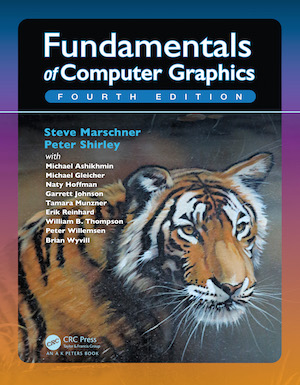Tuesdays 15:00-17:00 in BA 1170 Zoom (find link on quercus).
Prof. Alec Jacobson
[email protected]
+1 416-946-8630
Office hours Tuesdays 17:00-18:00 in BA 5266 Zoom.
Tutorials Thursdays 16:00-17:00 in LM 161 Zoom/Discord.
Tuesdays 13:00-15:00 in RW 117 Zoom (find link on quercus).
Prof. David I.W. Levin
[email protected]
Office hours Tuesdays 15:00-16:00 in BA 5268 Zoom.
Tutorials Thursdays 14:00-15:00 in BA 1190 Zoom/Discord.
This course introduces the basic concepts and algorithms of computer graphics. It covers the basic methods needed to model and render 3D objects, including much of the following: graphics displays, basic optics, affine and perspective transformations, windows and viewports, visibility, illumination and reflectance models, parametric representations, curves and surfaces, texture mapping, graphics hardware, ray tracing, graphics toolkits, animation systems.
Through the weekly seminars at the Toronto Geometry Colloquium, students will be exposed to a wide variety of cutting-edge research in an exciting subdiscipline of computer graphics: geometry processing.
Prerequisites: C/C++ Programming, Linear Algebra, Calculus,(course codes).
Please post your questions about the lectures, readings, and assignments on the Discord. TAs will monitor this board and attempt to answer questions as they appear. Near deadlines responses may take longer, so please start assignments early. If your question is not being answered, you may ask it again at the tutorial or office hours.
This class involves required reading from:
Fundamentals of Computer Graphics, Fourth (or Fifth) Edition, Steve Marschner, Peter Shirley, et al. 2015.
Digital e-book are available at CRC Press.
Students are expected to buy and read the specified chapters of this textbook. Exams and assignments will depend not only material covered during lectures, but also on material from the assigned readings.
| % | Item |
|---|---|
| 5% | Toronto Geometry Colloquium Participation |
| 8% | Assignment 1 |
| 8% | Assignment 2 |
| 8% | Assignment 3 |
| 8% | Assignment 4 |
| 8% | Assignment 5 |
| 8% | Assignment 6 |
| 8% | Assignment 7 |
| 8% | Assignment 8 |
| 11% | Midterm exam |
| 20% | Final exam |
Assignment dates still based on Fall offering. Will be updated soon.
| Week | Topic / Event |
|---|---|
| 1 | Introduction, Demos of Solutions Assignment 1 (Raster Images) due 12:00 noon 19/01 (for students on the waitlist: zip your src directory and send to the TA email address ([email protected]) so that you get a timestamp) |
| 2 | Assignment 2 (Ray Casting) due 12:00 noon 26/01 |
| 3 | Assignment 3 (Ray Tracing) due 12:00 noon 02/02 |
| 4 | Assignment 4 (Bounding Volume Hierarchy) due 12:00 noon ./intersections related portion only worth 10%) happy Lunar new year 🐅 |
| 5 | Assignment 5 (Meshes) due 12:00 noon 16/02 (Note: ./quad_subdivision related portion only worth 10%) |
| 6 | Object-based Rendering Transformations and Projections Assignment 6 (Shader Pipeline) assigned due 12:00 09/03 happy reading week |
| 7 | Real-time graphics pipeline, review for mid-term |
| Thursday, March 3 | 24-hour take-home exam due 12:00 04/03 (11% of grade) tentative date |
| 8 | TBD |
| Monday, March 14 | Drop date (consider if current grade is <50%) |
| 9 | Assignment 7 (Kinematics) due 12:00 noon 16/3 (Note: inverse kinematices I,i related portion only worth 10%) |
| 10 | Assignment 8 (Mass-Spring Systems) due 12:00 noon 31/3 |
| 11 | The future of Computer Graphics |
| 12 | Study for exam next week. |
| Final | Final exam (20% of grade) |
Academic Honesty (required reading)
Assignments must be submitted electronically, using MarkUs.
Code that you submit to us must work on the CS Teaching Lab machines in order to earn credit.
0.007% off for every minute late.
All assignments must be completed individually.
Any code must belong to the student submitting it. Submitted assignments will be automatically analyzed to identify suspicious levels of code similarity. Consequences of committing an academic offence can be severe.
By enrolling in this course, students acknowledge that they have read and understand the University of Toronto's definitions and policy on Academic Integrity.


